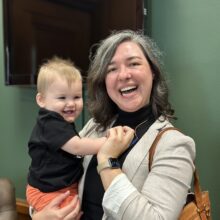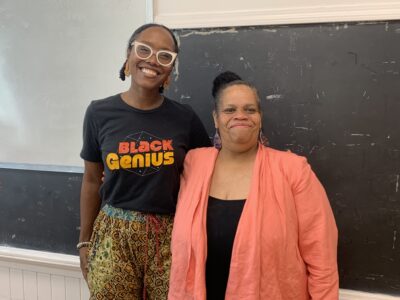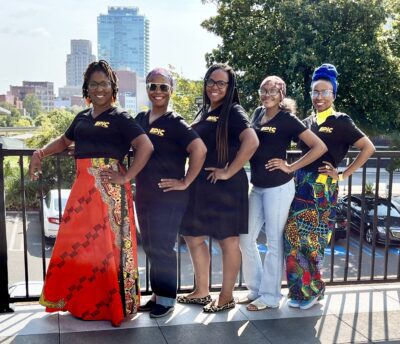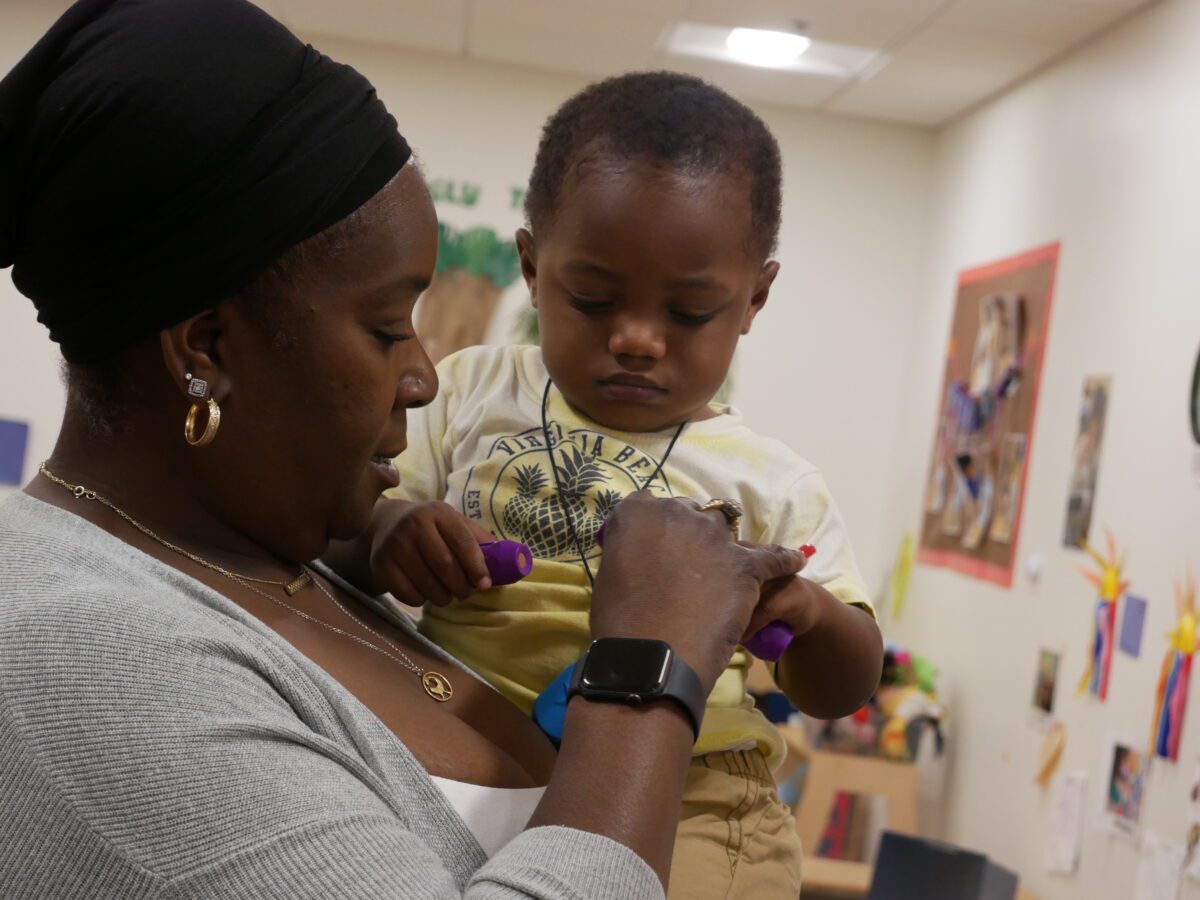
|
|
Kate Goodwin describes her vision for early childhood care and education as being like a tree: “When a seed is planted and nurtured in fertile soil, it grows into a tree that provides for many.”
That seed may be a child who will grow into a caring adult. Or that seed may be an investment in an early childhood teacher who continues their education. Or that seed may be a single child care site that branches into a network of support for children, their families, and their community.
Goodwin has spent her career working with and for young children, and now that work has culminated in the creation of Kate’s Korner Learning Center at the American Tobacco Campus, the first of several early learning sites she has planned in and around Durham.
“If you get those roots flowing enough, you can make the biggest, the biggest impacts,” Goodwin says.
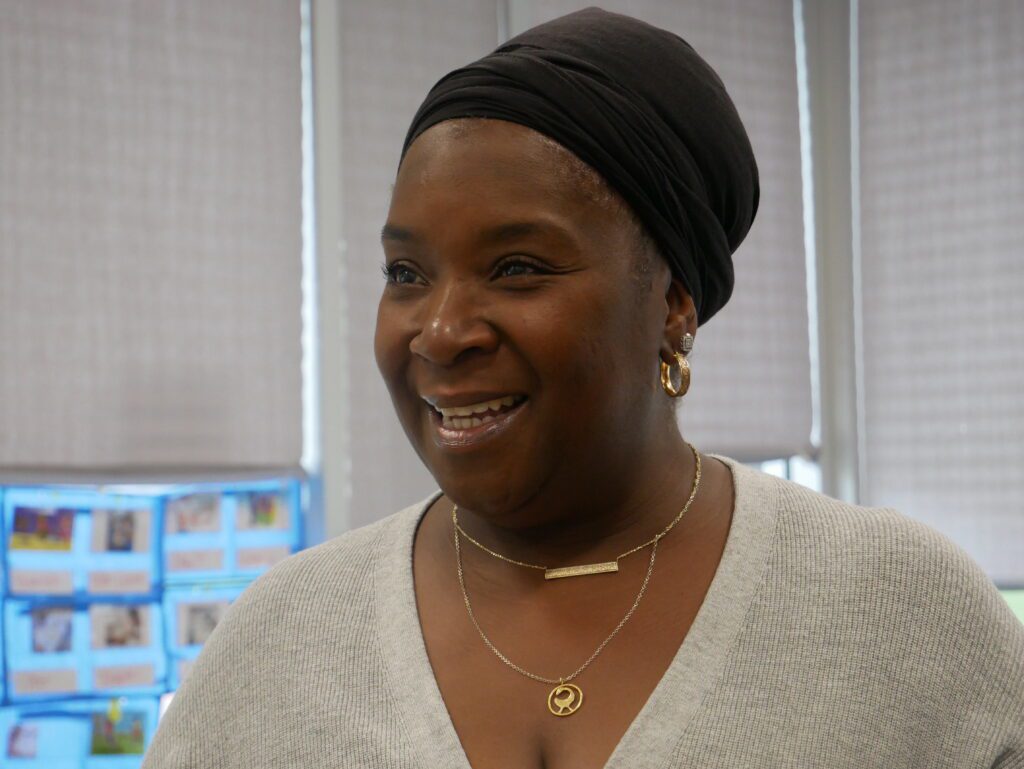
Planting the seeds
Kezia Goodwin, who typically goes by her childhood nickname of Kate, is the youngest of Thomas and Jean Goodwin’s nine children. She credits her parents and other ancestors for guiding her to where she is today.
Her father was a bishop, who she says would be called across the country by their church to mend congregations that had been disrupted.
When they arrived at a new congregation, her parents would stay in the homes of families with the least means, buying them new household goods and learning about their experiences firsthand.
“This is how you make a congregation work,” Goodwin said. “You take care of everybody. You meet people where they are, and love them to where you want them to be.”
That’s something her mother used to say, and it has informed her own work on behalf of young children, their teachers, and their families.
Much of her experience comes from working for KinderCare Learning Centers — a for-profit child care company with more than 200,000 students nationwide. While working for them, she imagined opening her own early learning center that would focus on the health and well-being of the community around it.
Her vision for Kate’s Korner included a garden where families, children, and teachers grew food for the center’s kitchen, and for their own homes. Children would learn to prepare the healthy meals they ate each day, made of the food they grew themselves.
Goodwin’s first attempt to establish Kate’s Korner began in Texas in 2007.
Her plans were coming together until a storm in 2010 triggered a series of events that led one of her major funders to shift priorities and pull their funding. Kate’s Korner — through no fault of Goodwin’s — was forced to close.
She lost her business, her savings, her income, and ultimately access to housing.
For months, her two younger children stayed with friends while she spent her nights at a homeless shelter. Her oldest son left college to help out.
Goodwin swore she would never work in child care again.
“It was the failure,” Goodwin said. “It was so epic.”
But she has a different perspective today.
“I love mistakes! Kate’s Korner was a mistake 10 years ago,” Goodwin said. “I don’t ever lose; I always learn something. So if that’s the case, just make the mistake and then we know what to do better.”
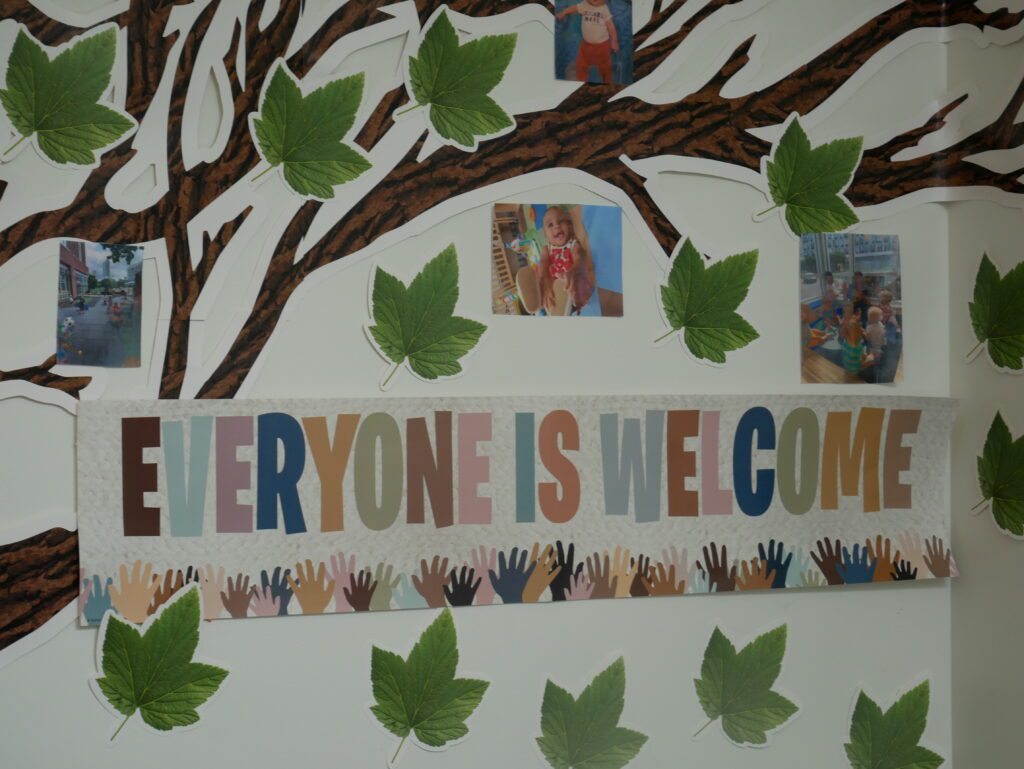
Sprouting new growth
Over the next few years, Goodwin rebuilt her life, ultimately finding herself back in early childhood education in a new leadership position. That’s how she met the person who would become her professional partner — another Kate.
Kate Jordan-Downs led a training that Goodwin attended. Jordan-Downs shared a story about her biracial son experiencing exclusionary discipline at age 5. She explained how implicit bias — a form of bias that occurs automatically and unintentionally — against Black boys can play an outsized role in the application of exclusionary discipline, even for our youngest learners.
That was a familiar story for Goodwin, whose own Black son had a similar experience 20 years earlier around the same age.
“I noticed that she was very, very quiet,” Jordan-Downs said of Goodwin, “and also the only Black person in the room, and just had a tear in her eye.”
Goodwin remembers that moment clearly as a turning point in her life as an educator.
“She’s giving me verbiage that I’ve never had as an educator,” Goodwin said of Jordan-Downs. “I’d been in the field for so long and I’d never heard anyone talk about implicit bias. Even though I’d seen it, experienced it, and trained people out of it, I never had a word that said this is what it is […] so when I spoke with her afterwards, I was just in tears.”
The two Kates bonded in that moment. Jordan-Downs invited Goodwin to join her at the 2016 conference of the National Association for the Education of Young Children. Goodwin agreed.
Jordan-Downs had arranged to meet with Dr. Walter Gilliam, the nation’s leading researcher on the intersection of implicit bias and exclusionary discipline in early childhood education settings, at the conference before his presentation. Goodwin joined in.
“And so we sat down on the floor with him at the NAEYC conference,” Goodwin said, “and talked about the research. And we were like, ‘So, you know, what should we do?’ And he was like, ‘I don’t know, I’m a researcher. I gave you the information, now I’m gonna follow you and see what you do with it.’”
Jordan-Downs shares that memory of Gilliam: “And he said, ‘I don’t know, I’m just a researcher. You guys are the people in the trenches, and that’s what you need to figure out.’”
They didn’t know what they were going to do yet, but the seed had been planted. Whatever they did, they were going to do it together.
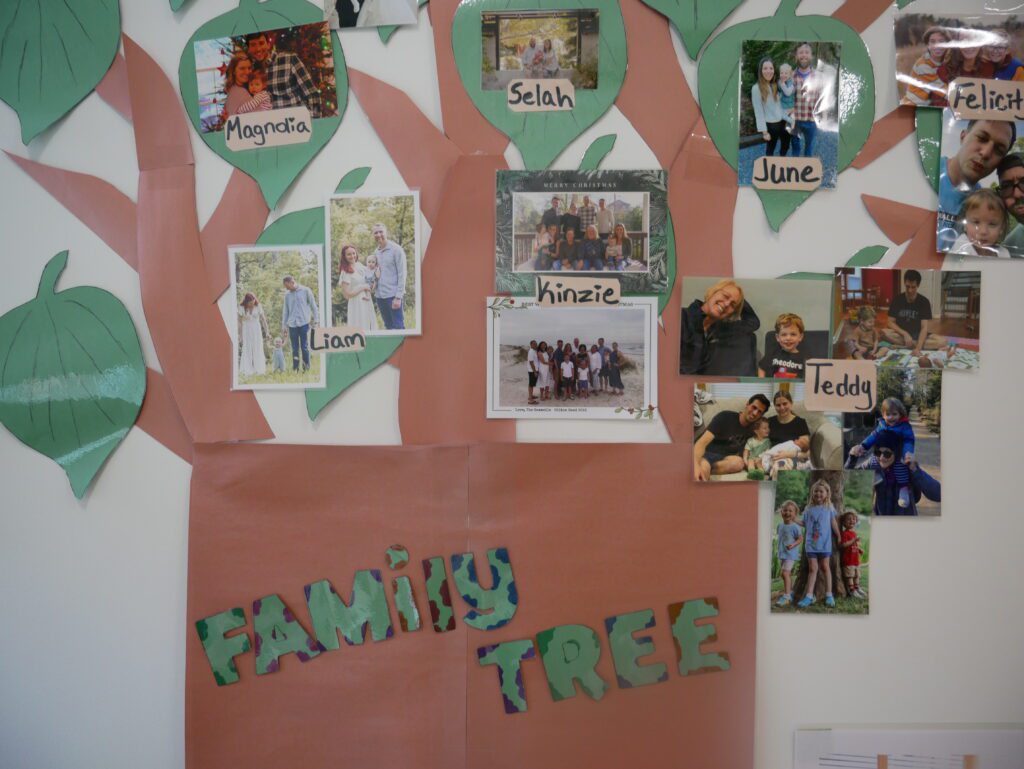
Digging in
Goodwin had never stopped tending her other seed, the idea for Kate’s Korner. Partially because her father wouldn’t let her.
By the time he was 92, Thomas Goodwin was experiencing dementia. On bad days, when he didn’t recognize Kate as his daughter, he bragged to her about having a daughter who was starting an early learning center called Kate’s Korner.
But the last time Kate Goodwin saw her father, it was a good day — he recognized her, though he was still a bit fuzzy on their timeline.
“He was like, ‘How’s Kate’s Korner?’” Goodwin said. “And I was like, OK! OK! I’m gonna figure it out!”
Thomas Goodwin died in 2017, about the time that his daughter Kate was recovering from back surgery and was advocating for her employer to accept more families paying for child care with state subsidies. She was in pain — emotionally, physically, and morally — and knew she needed a break.
She turned to Jes Averhart, one of her closest friends.
“She was like, ‘I’m having a rough time, like I’m having a rough day. Can I come and visit?’” Averhart recalled. “I said sure, and she bought a ticket for the next morning, and never left.”
Averhart is an entrepreneur, author, and leadership coach who has been living and working in Durham for almost 20 years. She helped Goodwin land a role as director of operations at Urban Ministries — a nonprofit working to end homelessness and poverty — where she got to know Durham and the community.
As she settled into her new life in Durham, Goodwin and Jordan-Downs were still working together on the task that Gilliam had set out for them — envisioning a model for early childhood education and care free of the harmful effects of implicit bias.
And like Goodwin’s father, Averhart wouldn’t let Goodwin abandon her dream for Kate’s Korner.
At a Durham Bulls baseball game in 2019, Averhart introduced Goodwin to Michael Goodman and Adam Klein.
Goodman is the vice president of real estate for Capitol Broadcasting Company (which owns the Durham Bulls, the American Tobacco Campus, and American Underground). Klein is the director of Durham real estate for the American Tobacco Campus and American Underground.
“I introduced her and I said, ‘She’s got a really interesting model around child care, and I think the only place she can build it is Durham, and I think you guys should meet,’” Averhart said.
That meeting would provide the fertile soil for the seed of Kate’s Korner.
“We struck up a conversation about the need for more downtown child care centers in Durham and Durham’s lack of good child care options in the downtown core,” Klein said, “not even necessarily that there aren’t good ones, but there aren’t any.”
Soon after, they began discussing the possibility of opening Kate’s Korner at the American Tobacco Campus (ATC).
“We were actually pretty far along in that conversation, and then COVID hit,” Klein said.
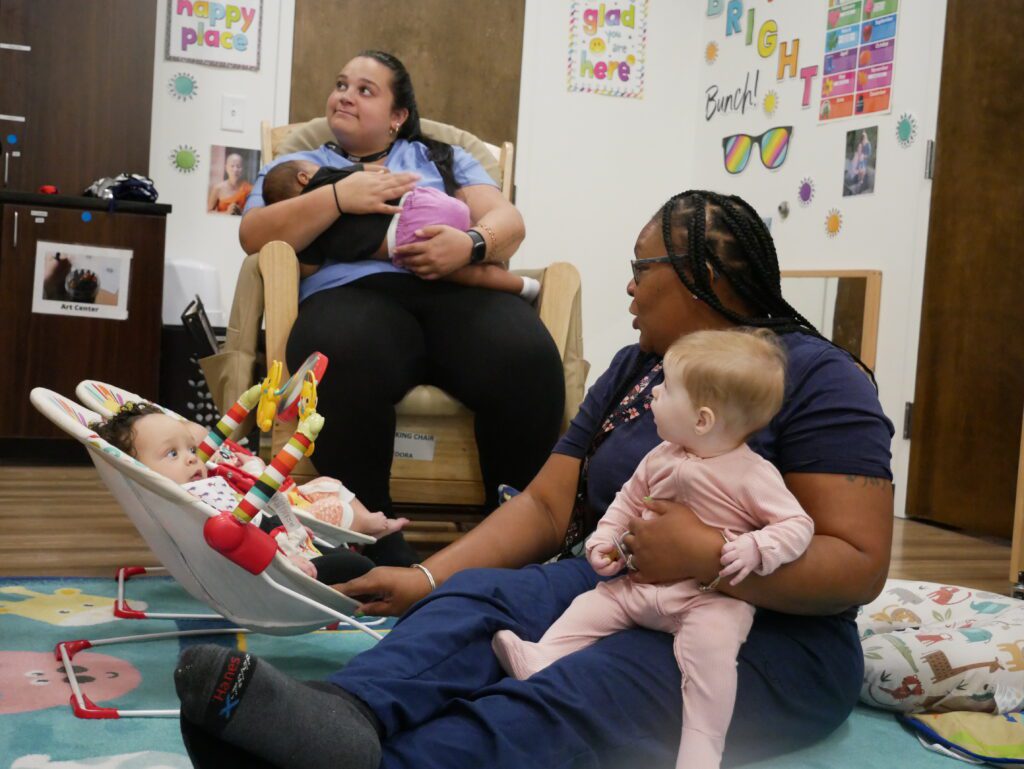
Putting down roots
The COVID-19 pandemic disrupted education at every level — from infants to graduate students.
Goodwin saw a need that she could help meet.
When Durham Public Schools moved to virtual learning, many children (“especially children of color,” Goodwin said) didn’t have access to the technology or environments they needed to effectively participate.
Thanks to funds from the American Rescue Plan Act, “I literally took a warehouse, and I rebuilt that warehouse to have seven large, large rooms for distance learning to actually happen,” Goodwin said.
For much of 2020 and 2021, Goodwin managed virtual learning for about 200 Durham Public Schools students, first in that warehouse provided by a tech company, then on the campus of Durham Technical Community College.
“I would say what she has really understood quickly about Durham is it’s a place where institutions want to come together and find solutions together,” said J.B. Buxton, president of Durham Tech.
As traditional public schools reopened, the need for a virtual learning site dissipated. Goodwin and Klein reinitiated their conversations about bringing Kate’s Korner to the ATC.
Goodwin conducted a market study of ATC tenants and other downtown businesses to learn about their child care needs. It was clear there would be no shortage of children to fill slots.
Knowing this, Klein was able to justify investing in a $500,000 upfit to convert an empty restaurant into a child care site. That cost was incorporated into a 10-year lease agreement, on which Klein was also able to cut Godwin a deal.
“We’re below market rate because this is something that’s really important for our users on campus,” Klein said. “[Kate’s Korner] adds value that way.”
In addition to this investment from ATC, Goodwin raised money from private equity investors — including Jes Averhart — and received loans from the Carolina Small Business Development Fund, UDI Community Development Corporation, and Pinnacle Financial Partners.
Klein cites three main reasons for wanting to bring an early childhood education center to the ATC: continuing to promote locally owned businesses, supporting parent employees who work at those businesses, and developing the future workforce of Durham.
“We know that when children have a supportive environment and a good start in their life, they’re more apt for success later on,” Klein said. “We see [Kate’s Korner] as part of that continuum of how we cultivate a really strong workforce here in downtown Durham.”
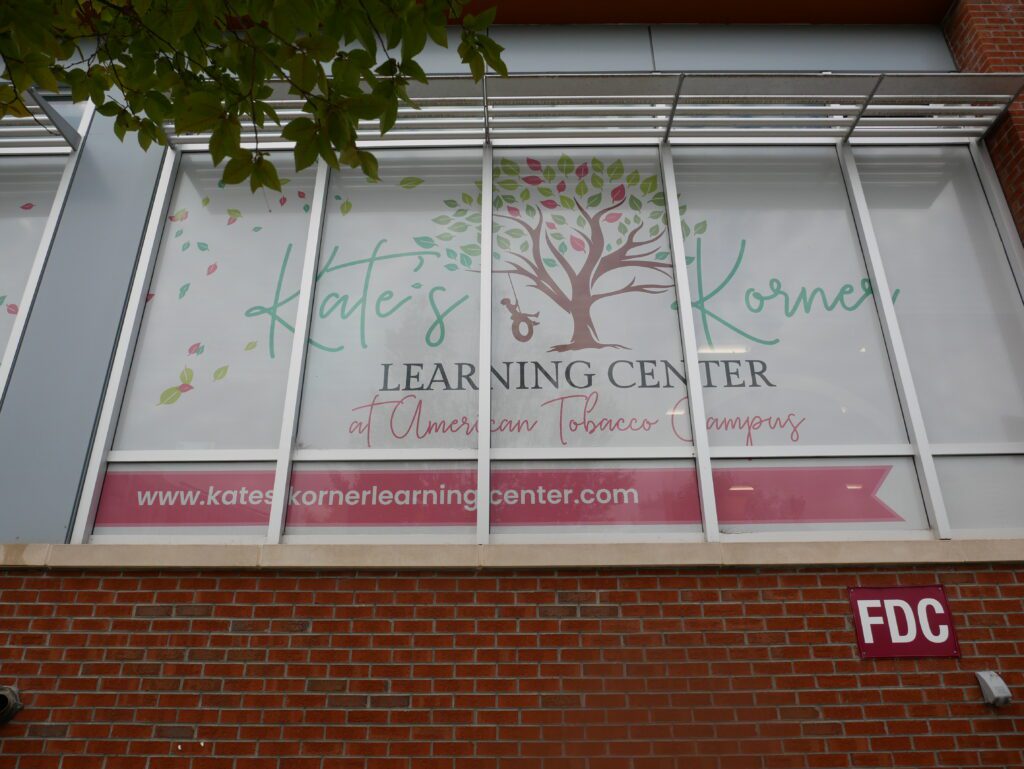
Branching out
By the time that the plan for Kate’s Korner was finally coming together, Goodwin and Jordan-Downs had established the Truth Education Foundation.
Truth Education Foundation’s mission is to expand the research base in early childhood education, as well as develop innovative tools to provide culturally responsive training & coaching services for early childhood professionals that positively impact the educational and social-emotional outcomes for children from infancy through third grade.
They imagined Kate’s Korner as a lab school for putting the research of the foundation into practice — just as Gilliam had encouraged them to.
Goodwin and Jordan-Downs operate on the belief that the source of implicit racial, gender, and class bias in early childhood education is at least partially rooted in the way the workforce — predominantly poor Black women — has been treated. That’s why their research is focused on how to empower the educators in early childhood classrooms.
“My parents always used to say everything has a source,” Goodwin said. “It can be a bitter root source, or a healed root source, but everything has a source.”
By focusing on healing the bitter root source of implicit bias among educators — helping teachers see their own humanity, dignity, and worth — both Kates say they expect those educators will be better able to fully attend to the students in their care, reducing reliance on biases that can lead to exclusionary practices.
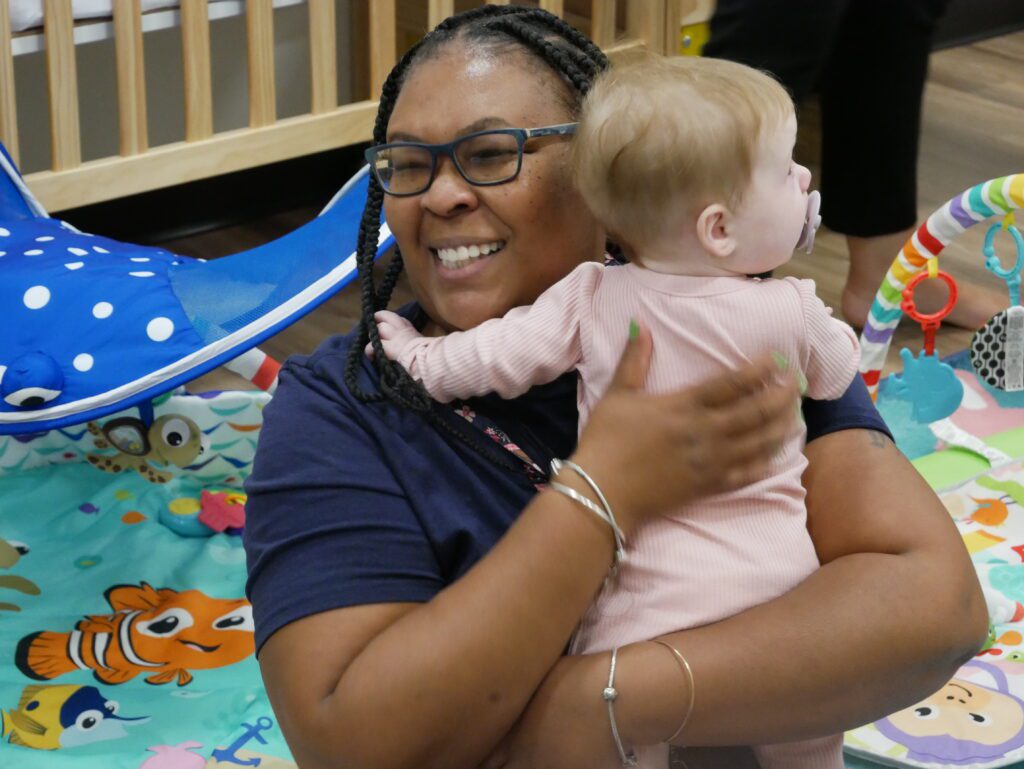
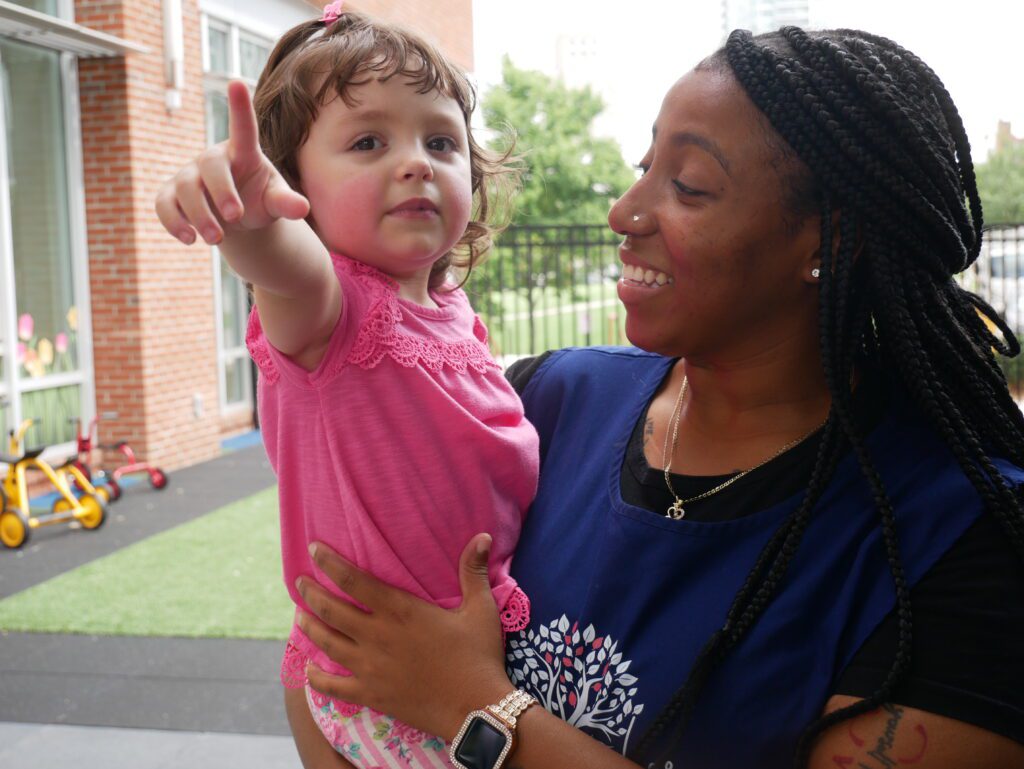
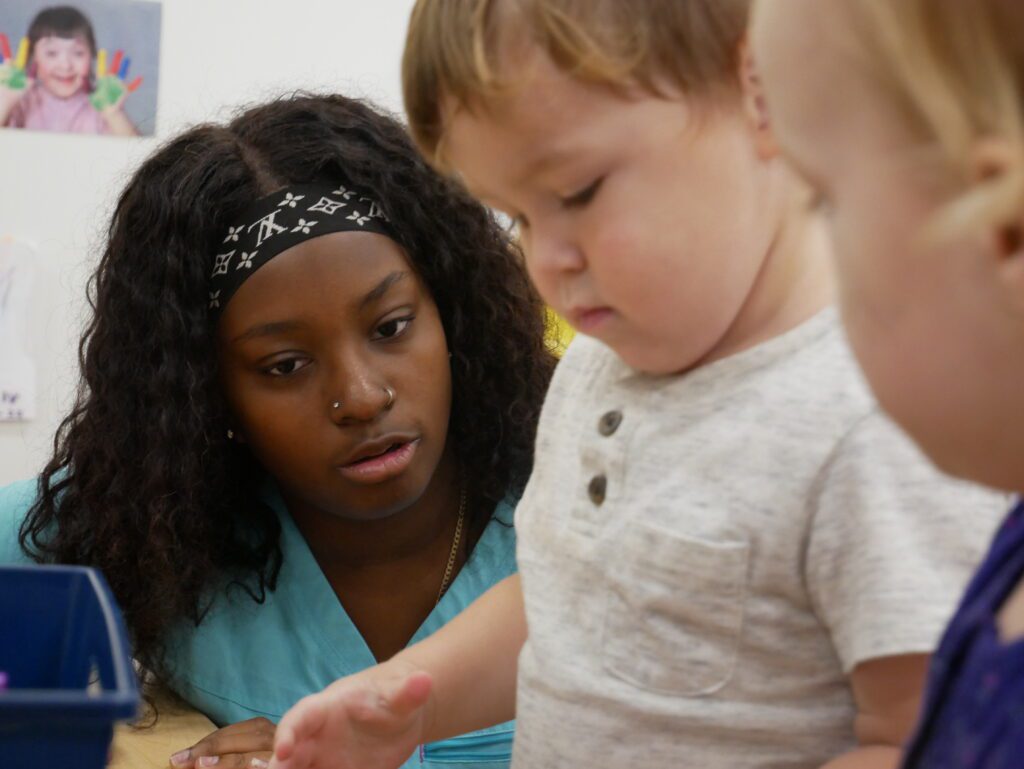
Kate’s Korner Learning Center opened at the ATC in the spring of 2023, with this empowerment model firmly in place.
It starts with improving wages and benefits, so educators don’t have to worry about paying their bills, finding child care for their own children, or taking care of their health and well-being.
No one on staff is paid less than $18 per hour, and lead teachers are salaried. Educators are provided with health insurance, child care on site, unlimited paid time off, and financial support for continuing education.
But improving compensation alone isn’t enough.
“Just because you give somebody $20 an hour doesn’t mean they believe that they deserve $20 an hour,” Goodwin said.
That’s part of why Goodwin secured a grant to bring a therapist to the center, who leads yoga classes, group therapy, and offers individual support.
“This is absolutely the work of healing,” Goodwin said of the empowerment model. “How do I heal that person? And then how do I allow them to free flow that down [to students]?”
About 20% of the families with students at Kate’s Korner receive state subsidies to afford child care.
“But that’s an intentional, purposeful thing,” Goodwin said. “This center is a foundation that brings in revenue so that I can go and do in East Durham what I’m trying to do, to service those child care deserts.”
That includes a center she’s planning to open on the campus of Durham Tech.
“We knew coming out of COVID that child care was going to be one of the things that kept people from being able to either enroll or re-enroll,” Buxton said.
Providing child care for students, staff, and neighbors of Durham Tech is part of Buxton’s own vision for expanding the college’s role in the community.
Goodwin is working with an architect to retrofit a building on campus. She expects the project to cost $1.3 million and is looking to philanthropic donors for funding.
People who know Kate Goodwin and have already partnered with her believe in the seeds she’s planted, the roots she’s put down, and the branches she’s spreading out.
“I think Kate’s mission of supporting all families with high-quality child care is really important,” Klein said. “It’s a beautiful picture where you can see kids from lots of different backgrounds experiencing the same setting, the same quality of care, together.”
“This is about disrupting an industry and changing the way we support the communities that we say we want to support, in ways that are meaningful and relevant to the family,” Averhart said.
“What I love about working with her is she speaks things into being,” Buxton said. “Once she gets hold of an idea and a vision and begins to conceptualize it, when she starts talking about it, that’s when I know it’s gonna happen.”
After a recent visit to Kate’s Korner, state Sen. Rachel Hunt (who’s currently running for lieutenant governor), expressed enthusiasm for Goodwin’s empowerment model:
“Kate and her staff are dedicated to providing every child who walks through their doors with a safe and nurturing environment to grow and learn. At a time when more than 1,700 child care centers across North Carolina are expected to close their doors this year and when legislators refuse to address a mounting child care crisis affecting many young families, Kate Goodwin is forging a new path. I’m excited to watch as she continues to impact the lives of Durham families.”
In the meantime, Goodwin will keep meeting people where they are, and loving them to where she wants them to be.
